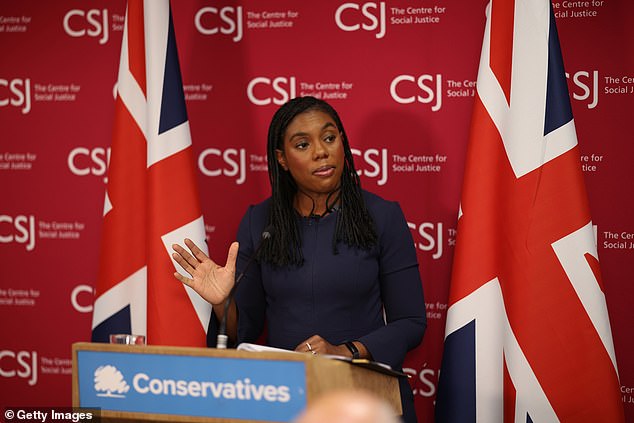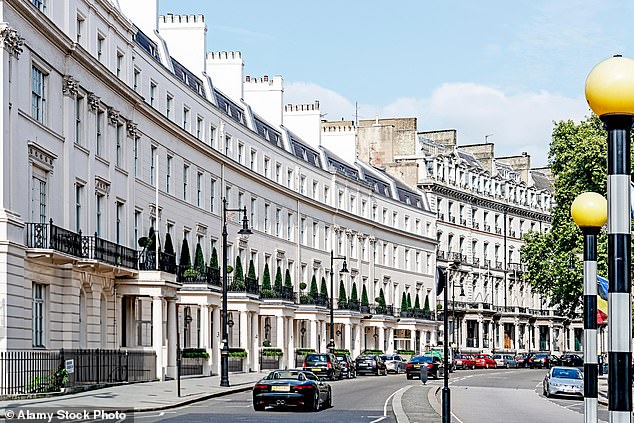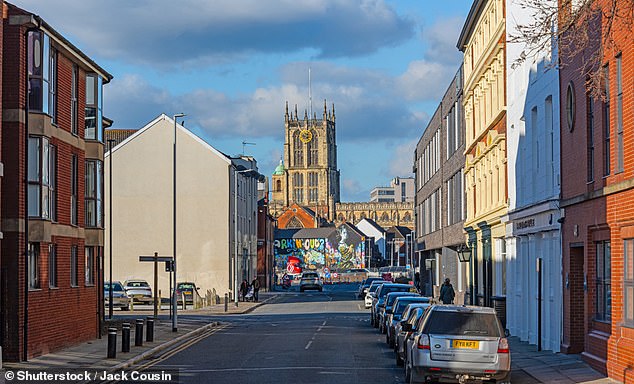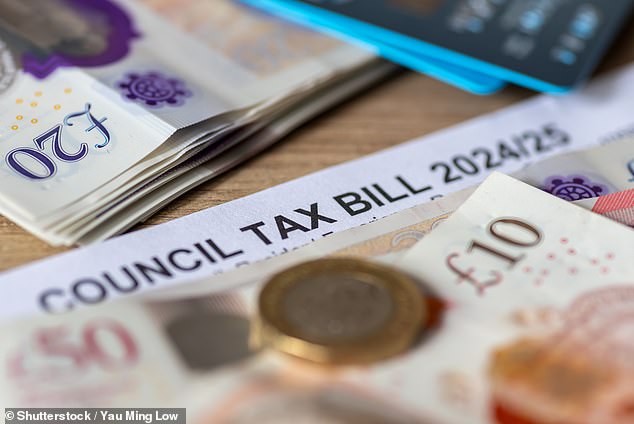Labour is being urged to hike council taxes in some areas by up to 410 per cent.
Under controversial plans to completely redraw the ‘outdated’ system, an influential thinktank wants to scrap the existing bands that determine the size of bills.
The Institute for Fiscal Studies (IFS) claims they should be revised using up-to-date house price estimates and a percentage tax on the home’s new value.
Councils in traditional Labour heartlands across the North would be ‘winners’ if such sweeping changes went ahead. In Kingston upon Hull, average bills would be cut by 60% – saving residents the equivalent of £700 a year.
Yet in parts of London and the South East, average bills would soar 5-fold. Residents in Westminster, for example, would have to fork out £4,645 extra.
The Daily Mail has today made a search tool which reveals how your council tax bills could change, if one of the most extreme IFS proposals were adopted.
Armed with similar analysis by the thinktank, Wales has already announced that it will carry out a massive revaluation of property prices in 2028.
The IFS floated similar proposals for England in March 2020, just days before Covid struck, although ministers never acted on them.
Ahead of its landslide election victory, Labour ruled out changing council tax bands in England.
But Kemi Badenoch last month warned that a raid could still be on the cards because of the looming changes in Wales.
Pointing to how Sir Keir Starmer once called the country a ‘blueprint for what Labour could do in Government across the UK’, the Tory leader wrote in the Daily Mail: ‘You can bet it’ll be coming to England next.
She added: ‘If you’ve worked hard, improved your home, or simply live in a nice area, your bills could soar.’
Stuart Adam, one of the authors of the original IFS report, titled ‘Bringing council tax in England into the 21st century‘, told the Daily Mail: ‘The Government should use our report as their blueprint for reforming the outdated council tax system.
‘The failure to revalue council tax for 34 years – and counting – means the tax bills households face bear less and less relation to the values of their properties.
‘We wouldn’t tax people’s incomes based on the relative salaries their jobs paid 34 years ago – but we do tax their housing based on the relative values of their properties 34 years ago.’
He added: ‘At a minimum the Government should therefore revalue properties and put in place a cycle of regular and frequent revaluations to stop us getting in this situation again. Ideally it would undertake more radical reform too.

Kemi Badenoch last month warned that a council tax raid could still be on the cards because of the looming changes in Wales

If the IFS shake-up went ahead, the biggest losers would be houses in Westminster (pictured) as residents would face an average 410% increase in annual council tax bills

On the other end of the scale would be the councils of Kingston upon Hull, which would see a reduction in costs of 60%
‘It must be done at some stage, or we would still be basing council tax in 2091 on relative property values in 1991 – an absurd state of affairs.’
Current council tax banding, which determines the size of bills, has been unchanged since properties were first assessed in 1991, when it replaced the poll tax.
Valuations were carried out by estate agents and surveyors who drove down streets to make quick judgements.
Band A, the cheapest council tax band, covers homes worth less than £40,000.
On the other hand, Band H, which is the most expensive, includes those worth more than £320,000.
Since the bandings were rolled out however, the value of homes in commuter towns dotted across the Home Counties has increased six-fold.
Prices have only gone up by a factor of 2.5 in areas like County Durham.
Andrew Dixon, of Fairer Share: the national campaign to reform council tax, told the Daily Mail: ‘The IFS is right to highlight the urgent need to update and reform council tax.
‘Their analysis shows what households across the country already know: council tax is deeply unfair, regressive and out of date.
‘Families in towns like Hartlepool, Wigan and Bolton are already paying between 1–2% of their home’s value every year, while owners of multi-million pound properties in London and the South East pay as little as 0.05%.
‘That is a de facto wealth tax on ordinary working people.’
Under the original proposal published by the IFS, Band A would be updated to cover homes worth less than £142,000 as of the start of 2019. Homes valued in excess of £1,769,840 would fall under Band H.
The Daily Mail used these figures to illustrate how bills could look today.
Six scenarios were initially floated by the IFS, beginning with the ‘relatively modest’ option of revaluing properties.
Its preferred scenario, the one we have modelled, sees a proportional tax applied to the new value.
If the IFS shake-up went ahead, the biggest losers would be Westminster (average 410% increase in annual council tax bills), followed by Kensington and Chelsea (358%) and Wandsworth (166%).

Although average tax bills wouldn’t change, the IFS said that more people would see their bills reduced than increased
On the other end of the scale would be the councils of Kingston upon Hull, which would see a reduction in costs of 60%, followed by Stoke-on-Trent (57%).
Sir Keir Starmer’s own council, Camden in north London, would see rates rise by 155% if the IFS proposals were to be enacted.
Although average tax bills wouldn’t change, the IFS said that more people would see their bills reduced than increased.
In response to cries for reform, Labour launched a council tax consultation in June to help ‘work with councils to fix what is broken’.
Jim McMahon, the local Government minister, unveiled proposals to send more than £2billion ‘to the communities that need it most’. Taxpayers in the south may see their rates rise as the Government seeks to funnel more cash to the North.
Council tax property revaluations were not mentioned in the full blueprint.
The Treasury has already suggested that local authorities will have to hike bills by the maximum – 4.99% – every year for the rest of this Parliament.
It comes at a tough time for councils, with many facing bankruptcy or forced to cut services, especially discretionary ones such as youth clubs, childcare and museums.
Ever since council tax was introduced in 1993, no minister has dared order a national revaluation of properties.

The department in charge of council tax reform is led by Angela Rayner, who has attracted controversy recently due to rows over the taxes on her homes
Although one was due in 2005 by the then local government minister David Miliband, he delayed it – a move labelled by one critic in the Guardian as ‘done out of sheer fear’.
However Wales is leading the way, with their revaluation creating new property bands that are predicted to raise council tax for over 470,000 homes and reduce it for about 800,000 households.
The IFS is also producing a report for the Scottish Government outlining how it could follow similar proposals, as it also still uses 1991 property values.
But it is expected there will be a political battle over the change in England, with local government insiders warning any reform to the system will be ‘polarising’.
But Mr Adam argues the government needs to act, adding: ‘Reform would create millions of losers as well as winners, which means doing it would probably involve some political pain.’
The biggest supporters of changing the system are a group of cross-party MPs known as the All-Party Parliamentary Group on Council Tax Reform.
Its chairman, the Labour Party MP for Hartlepool, Jonathan Brash, told the Daily Mail: ‘The Government is right to be looking at changing funding models through the Fair Funding Review 2.0.

Jonathan Brash is the chairman of the All-Party Parliamentary Group on Council Tax Reform
‘After decades of inaction, we have an opportunity to build a system that is fit for the twenty first century, that properly funds local services, and that stops hammering families in towns like Hartlepool.
‘I will continue to press for that outcome at every opportunity as we can no longer just tinker around the edges. Britain deserves better than that.’
A Treasury spokesman said it does not comment on speculation around future changes to tax policy.
They added: ‘We are committed to keeping taxes for working people as low as possible, which is why at last Autumn’s Budget, we protected working people’s payslips and kept our promise not to raise the basic, higher or additional rates of Income Tax, employee National Insurance, or VAT.’












